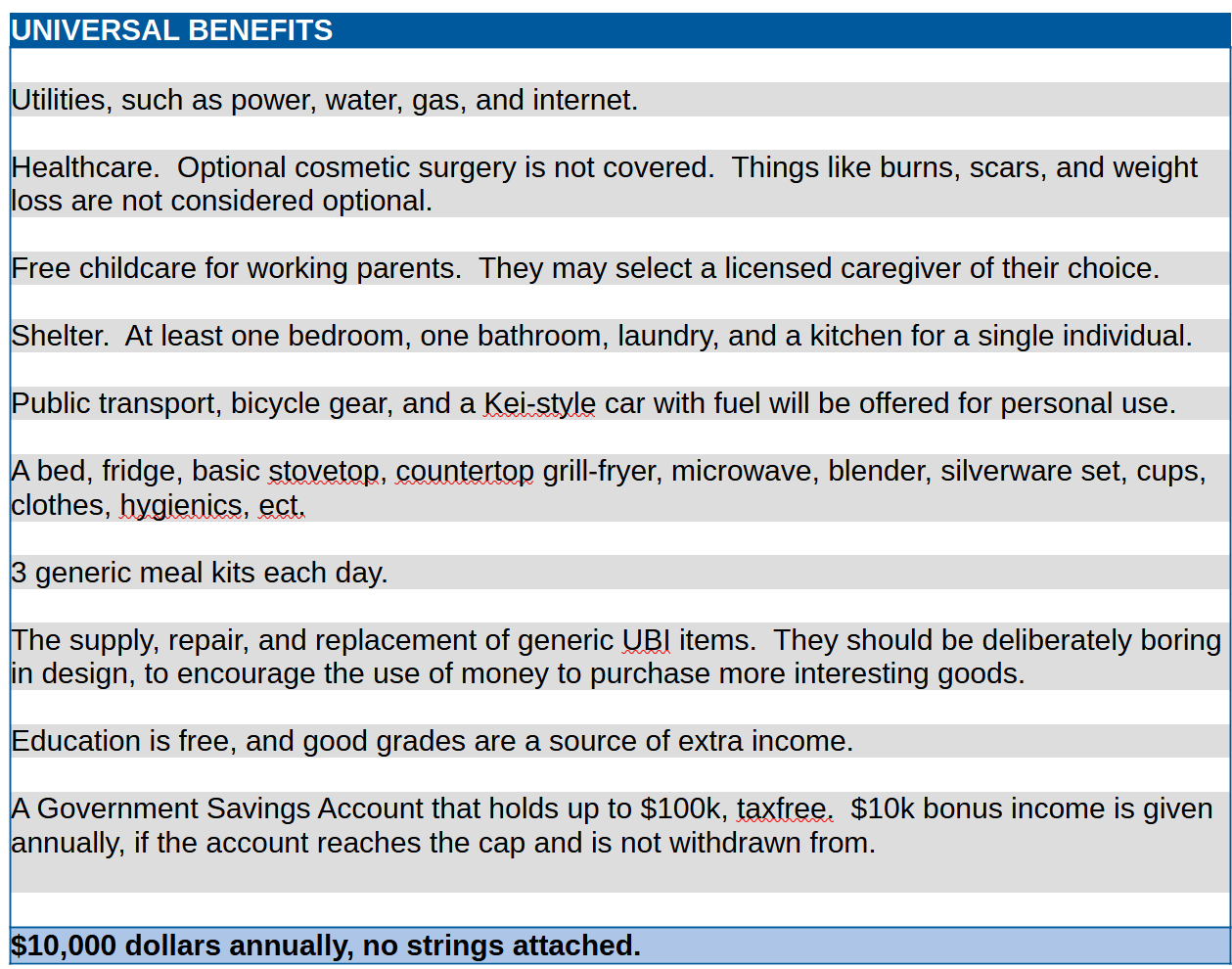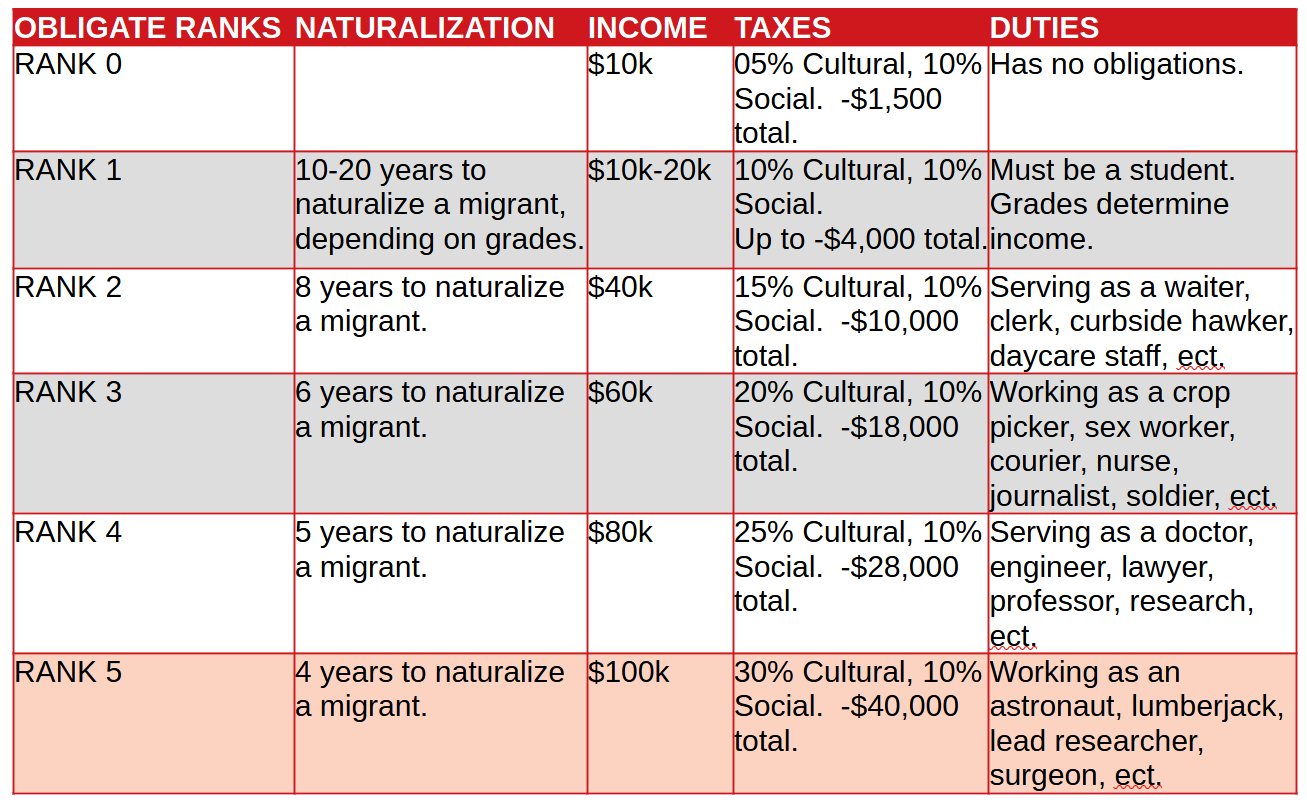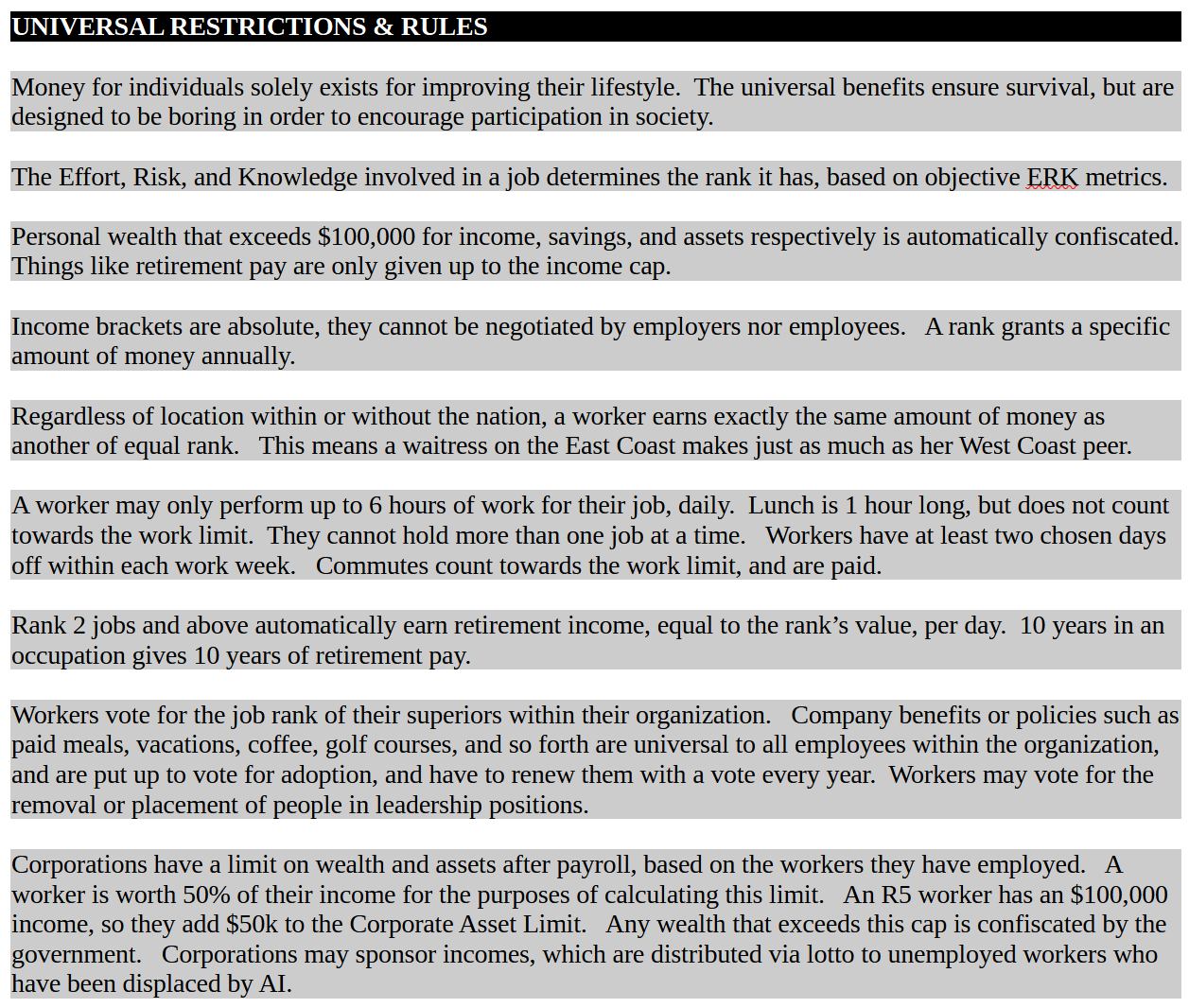UBI works. They experimented with it in Canada in the 70s, but didn’t have the funds to analyze the data. Once they did (decades later) they found out that it worked.
More recently when they tried again, Canadian conservatives shut it down less than half way and simply declared (without evidence) that it does not work.
Conservatives are a bane on this planet.
Typical for the conservatives here
Every UBI study shows how successful the idea is, but it’s ultimately a bad system, because all it will ever be is another form of Capitalism. What makes UBI successful is that people no longer have to struggle (as much) to pay rent and feed themselves while pursuing more worthy endeavors. If you read between the lines of every UBI success story, you find that money is just a middle man, an unnecessary toll booth between people and progress.
The real solution here is to guarantee a standard of living to people that includes housing, food, education and healthcare, without involving the exchange of money at all, because as long as these things are commodified, Capitalism will always find a way to provide as little of them as possible while charging as much as possible for them.
I think the arena that a healthy capitalism excels at, is the creation and distribution of luxuries. Capitalism should solely be used for that aspect in a economic system, but society must provide all necessities by default. This would allow us to benefit from the good parts of capitalism, while preventing it from metastasizing into a cancer.
“Healthy capitalism” is an oxymoron. It’s like saying “healthy cancer.” Capitalism has only existed for a few hundred years, like 2 or 3, but people have been making art and luxuries for tens of thousands of years.
Cancer is what happens when cells no longer have a mechanism to keep them from unchecked multiplication. We all need cells, but only in a effective quantity. The same applies to the assorted parts that make up capitalism.
I think that rejecting all of capitalism is a bad idea. Instead, the issues with capitalism and other systems should be identified, then have a designed arrangement to prevent those problems from developing.
I think the problem is that there are finite resources, so under any kind of UBI like system you still need a way to track and limit the number of resources one person can recieve to ensure everyone gets a fair share, the most convenient way is some kind of monthly allotment of tokens which are inevitably money.
I think the Universal Ranked Income concept that I outlined elsewhere in the thread would address this. I think most people would find generic goods to be very boring, thus they would be compelled to obtain money to buy something a bit more fancy. This would let us leverage the stuff capitalism is good at, namely the creation and distribution of products. So long as capitalism is never allowed to dictate a person’s wellbeing, I think it can be used to optimize society’s expenditure on resources.
And this is what a safe net (family, contacts, status, decent stable society, large amount of savings or inheritance…) do on all those that does not have to survive till the next month, once you give minimum grants of decent existence humans can explore beyond the basics of survivability…
And also prevents the exploitation by those who predates on people in desperate situation.
And we have enjough resources to have it also. All mega projects are done in the past.
The only reason the rich cunts try to tell us you ‘can’t just GIVE people free money’ is because they want all the free money for themselves.
Every single UBI experiment has the same results, it’s wildly successful. The only reason it will never happen for most of humanity is capitalism.
Very interesting. Some actual data to go with all the political bluster surrounding the idea of a Universal Basic Income.
There’s been data for years, maybe over a decade now. It’s just on the list of subjects the rich don’t want the poors talking about so they bury it.
There is a lot of data out there in the US, they’re trying it in a lot of places.
curious where Alaska’s pfd falls on the scale, or if it isn’t counted because it isn’t consistent or part of a controlled study.
I was thinking the same thing. I remember a study going around, but I don’t know enough about it to comment.
There are two kinds of peer reviewed research I like. 1. The amazing wild nobody ever expected it sort of results that upset multiple fields of research. And 2. The gradual, incremental improvements of what we already thought, but now with even better data. The former is uncommon and exciting; the latter merely extends the sphere of knowledge in expected ways. This clearly falls into category #2, so Yay!
So… Umm, where is the actual research paper? I could not find any links to an actual study anywhere on the project site?
I think one way to implement UBI, would be what I call a “Universal Ranked Income”. Everyone gets universal benefits - shelter, utilities, food, transport, gasoline, healthcare, all of this for free. However, the items and services are very generic. This is where capitalism steps in: money is used for buying luxuries, such as a fast car, physical books, a nicer home, fancy takeout, and so forth. Capitalism is terrific for catering to an individual’s tastes, but is horrible at ensuring wellbeing. Thus, the separation of necessity from luxury.
This permits people to strike or protest when they feel like it, since their survival isn’t at stake. They also can wait for suitable job opportunities, which would do much to punish abusive corporations. The amount of income a person gets is based on their job rank, with students getting an amount based on their grades, while higher tier workers get fixed incomes each year, regardless of experience or location.
Absolute floors and ceilings on wealth and income can also be implemented. That would prevent the accumulation of too much wealth by individuals and corporations. Corporations won’t be able to control the wages of their employees, which would also prevent inflation - people can’t be paid too much or too little for working, so pricing of goods will have be done according to what income bracket a seller wants to reach.



I can see that a lot of thought went into this and while I agree with many points, I also have to point out that this much control over people’s lives feels restrictive and authoritarian. Universal Basic Resources vs Universal Basic Income, I do lean towards UBR more, but not the rest of the government restriction. Housing, water, food, healthcare, and public transport are all we need to implement imo.
My suggestions, which I believe are much simpler, are co-op housing, potable tap water, ration cards, and free public transport at the level of the Netherlands. Healthcare, a lot of countries have sorted out so I don’t think I’ll comment much on - except to mention that I don’t believe weight reduction surgery needs to be free.
What parts are authoritarian? Aside from caps on excessive wealth and limitations on leadership, I don’t see much limiting an individual’s autonomy. As it is, most people are coerced into bad working conditions in order to live, which is a quite a shackle on personal liberty.
Assigning ranks based of job role, setting hard limits to work hours, income based on academic performance, pre-set food, bike, car, even cutlery and bedding - all of these things seem to reduce individuality and personal autonomy. It’s reminiscent of armies. I understand that there is a whole economy and this is only the starting point, but I would suggest a UBI on top of the UBR so the individual can choose how much to spend on bedding, what kind of cutlery they want, etc. I think it would be too wasteful, time-consuming, and impractical for a government to micromanage its citizens’ lives to such extents.
Edit: Forgot to mention but this system would also create a lot of waste. For example, what am I supposed to do with the cutlery I was given as a starter once I want to buy my own? Same with bedding, bike, and I think worst offender being the kei car. Not only would granting everyone a kei car increase car centrism and traffic density, it would be very wasteful because of how many resources go into making a car.
Thing is, you can democratize even the free stuff. For example, in order to sell luxury models of dishwasher on the market, a company has to offer a basic free model. People from there can select one of the free models on offer from however many companies, or opt to spend money to get something with more features.
In any case, an individual has to SPEND money to get education in a purely capitalist system. I think that getting money for luxuries from having good grades is much less authoritarian. A student can remain a student as long as they wish, in whatever field they are specializing in. Whereas, in our current capitalism, the vast majority of students are obligated to get a job, even while studying, otherwise they won’t get to eat.
Hard limits on work hours are principally a limit on workplace abuse. In Japan, you have to work overtime for free, else you are fired. While there are undoubtedly workaholics that an hour restriction would displease, I think most people would like to have free time to be human, not cogs. Also, workhour limitations means an employer has to hire a larger amount of workers, spreading out workloads more evenly. This actually improves productivity and resilience. For example, pregnancy leave won’t harm the workplace as much, since there are extra people to pick up the slack.
There are so many issues with this. Unsolvable issues.
The first that I saw was basing income on grades. This means that the person who determines whether you fail or pass, also determines how much money you get. I don’t think there is any good teacher out there that wants that responsibillity. So fuck that. Grades are for determining whether you pass or fail. The government should not use them for their own needs. If they so desperately want that, then let them make their own tests and grade these themselves.
The second is fixing income. If I do better than my peers, I want to be recognized for that. Otherwise, why would I put in the effort? Maybe this works for super simple jobs, like fruit picker on a farm. But anywhere where cognitive skills are required, you need to incentivise people to excel.
And that was still talking about jobs where you spend a fixed amount of time working. There are also many jobs, where it makes wayyy more sense to pay directly for delivered performance. For example: how do you fix the salary of a sex worker? Does that mean you fix the pay rate for the customers? Demand for certain people certainly won’t be equal, so how do you fix that?
What about overtime? What about working during holidays/weekends? What about nightshifts? Etc.
Then there is the issues of different personal survival needs. No single set of 3 meals a day will be both allergy-safe for everyone and nutricious enough to survive for everyone. Some people live fine without a microwave, others can’t live without it. Etc. Just giving people money removes the responsibility of determining what exactly is required for survival.
Then there is the issue of labor shortages. Take the Dutch childcare system for example. For many years now, the government has had the idea of lowering the prices significantly. But they can’t, because the number of licensed caretakers is already not enough to fullfill demand right now, and lowering prices would skyrocket demand.
The whole point of UBI is to let the market figure out many of the solutions to these problems. Keep it simple for the government, and only regulate when and where it actually helps.
If I do better than my peers, I want to be recognized for that. Otherwise, why would I put in the effort?
About this, I will try to find it. But there is quite some research that shows productivity in simple jobs (think assembly line, or fruit picking) goes up in relation to reward. But complex an skilled jobs actually give diminishing returns quite soon with a higher reward, because with complex jobs most of the satisfaction comes from doing the job itself and excelling not the reward.
When it comes to ranking job classes, it should be based on developing ERK metrics: Effort, Risk, Knowledge. This obviously would require many researchers to verify certain things: how many hours can the average person work in a field before needing a break, how many years of education before the average person can do a job effectively, and the frequency of death or injury from the task, and so on.
In any case, the income based on grades is for education - the idea being that students get paid for learning, and the more effective they are, the sooner they stop being students and enter the job market. The schools receive money for the grades students have, but have no part in the grading. It should be the state and federal government, through dedicated teams, that students are graded on tasks. Through the internet, it would be easy to transfer, archive, and grade copies of student work to these graders. This allows teachers to focus on teaching.
As to “If I do better than my peers, I want to be recognized for that. Otherwise, why would I put in the effort?”…honestly, I want this mindset to go the way of the Dodo. Your premise here is the very foundation of the rat race, because it creates excuses for individuals to be treated better than others in the workplace. If people do a job, it should be because they think it is neat, not so they could climb a social ladder.
When it comes to something like sex work, it can be based on whether you worked that day. If you did a lot of customers or just one, you get paid the same. While a company can certainly fire slacking workers, they also run a risk of an issue: worker votes. Workers, both fired and currently on staff, should be able to vote for leadership positions and benefits within a company. If workers don’t get enough clients, the company won’t make enough money to pay workers - so they are incentivized to find fair bosses who can dole out enough clients among the workers.
I would consider overtime and hazard pay to be the same issue. They can simply cause jobs to double in pay when in effect. Companies would try to avoid this when possible, so you would have the electric company trying to consistently maintain their infrastructure and services during regular hours. Night shifts can simply go to people who prefer them - after all, people have Rank 0 UBI. They are doing a job because they feel like doing so, and they will gravitate towards what feels most natural. Holidays are simply paid like any other day, regardless of whether anyone works.
The survival needs are a non-sequitur. “3 meal kits” means “3 meals a day”, of which people can obtain the types that suit their dietary needs. It just means that these kits are standardized. Hotdog #1 (regular) and Hotdog #6 (Halel), and so forth. The important thing here is that government offers a baseline quality and availability for food that anyone can obtain.
As to labor shortages, that is a problem - but one not unique to UBI. The best solution in that case is to encourage students to enter the workforce, by offering a benefit to graduate from schooling. Which is why all jobs have at least double the income in a ranked system.
Yeah I’ll agree with the other commenters, you came up with some good and very detailed ideas, but they’ll need some honing and fine-tuning to the reality on the ground. Maybe think about joining a political party? At the local level, you can get quickly connected with the right kind of people you can bounce your ideas off of.
That is difficult for me. I am autistic, and more importantly, I was raised in a rural area without people. I am not exactly sure how socialization works, and certainly can’t afford “third place” activities. Still, I might be able to manage it in a couple years. If America enters a civil war, I may be able to find a steady job and like-minded people to discuss this stuff with.
In any case, you are very much correct that the concepts will need refinement and trial. I think if people were to experiment with economic models, a good place might be an EVE Online style MMO - several shards, each running on a different economic structure. After a year, those shards can be linked together into a single server, then we watch which economic faction has the most population the year after. That could be a relatively safe way to observe economics.
UBI doesn’t work the bourgie scum will jack up the prices hard because they want to steal ALL the available money
One thing I often see skipped on in research like this is how the people that can’t manage their money are dealt with. Imagine i get UBI so i should be able to pay for groceries and rent, but I’m also an addict and spent all my money on drugs. This will still lead me to homelessness and starvation. I’m not saying this is a valid reason to not implement a UBI, I would even say it’s not a relevant argument for or against UBi. But groups like these will still exist and will still need help. Again, i feel like research like this only looks at the impact on stable people with a healthy mind. Will people still be willing to help out strangers if they expect the government pays for their rent and food? Or will the gap between the ‘smart people’ with normal lives and the ‘stupid people’ with broken lives only get bigger?
Everyone gets a chance. Just because not everyone uses it correctly doesn’t validate the current standard of no one getting a chance.
“Well, we could build a bridge but someone might walk across it to commit crime.” Is not a valid reason to cancel the bridge, it’s an aimless aside with no bearing on the conversation about how the bridge will help most people.
I agree
Awesome, I understand your reservations and I wish we could find a way to mass dispel them because it is a common perspective.
In my comment I never mentioned any personal reservations, I want to point out there is a lack of data on the effects it might have on the community as a whole. I feel I cannot be for or against UBI without knowing that, although seeing how big the positives are for individuals I am (and have been for a while) leaning towards being for it.
That’s also not what this study is about. And if you’re reasonable you can imagine how a more productive and happy society might be more able to take care of those who need social support
I know that is not what this research is about, it is why I start with ‘it is skipped on in research about UBI’, I would like what you believe is true to be actually true but there hasn’t been any research into that as far as I know. All research is about the impact it has on individuals and maybe their family but not on how it impacts social structures. If UBI turns out to be good for individual people but has a negative impact on how people treat each other, I might not want it. In the current system there are places where beggars earn more than an average wage and there are places were they’re neglected and basically starve to death if it isn’t for a few small organisations. If an entire country switches from individual benefits bases on their situation to a general UBI for everyone, that might have a big impact on the people who are on the bottom of society. It is naive to ‘imagine’ it will only bring good things. I’m not saying this because I don’t like UBI, I’m saying that because when and if it is implemented the government/society as a whole will have to deal with all effects, not only the positive ones.
That might also be an issue of culture. I suppose it would affect different people differently but I highly doubt that most people would become bad to each other when they are less stressed and have more stability.
That however, has been studied
True, but often as far as I know research like that is about how people respond to sudden changes and local crises, not necessarily how they would react in a different social system. But I do also expect people to treat each other better if the conditions of their lives are better.
The studies I happen to know about focussed on population density and resource abundance/scarcity. While not an exact analog I think they do give a decent estimate of this situation
It’s pretty wild you need a three-year study for this.
Yes, if people have steady and secure income, they will not have to take every shit job they come across because they don’t have to worry about being homeless or hungry next week.
I swear some studies are just stupid beyond imagination.
This is such a common gripe among non-scientists about science, and not only does it demonstrate 1. That you don’t understand the purpose of science, but also 2. that you’ve spent zero time attempting to understand why someone would want to study “obvious” things, because this complaint is so prevalent that numerous scientific communicators have put effort into explaining why this seemingly “common-sense” belief is actually counterproductive. So like, the answer you see is in front of your eyes. So then I ask, is this person making an effort to know or do they just want to complain and feel superior. Wanting to feel superior is very human, I can’t fault you for it, but consider spending some time trying to answer, “Why do scientists study obvious things?” next time, before deciding something is dumb.
That aside and onto a different point, some of the most fascinating results of science have been researching “obvious/stupid” phenomenon and getting surprising results. But… as stated above, all of that information is out there and you seemingly evaded it all this time, so I’ll stop there. I hope you’ll use this as an opportunity to seek out information next time instead of spending your time to construct a complaint, the world is a much more enjoyable place when you approach it with curiousity instead of judgement.
I wish you the best.
numerous scientific communicators have put effort into explaining why this seemingly “common-sense” belief is actually counterproductive
I agree with that if we’re talking about scientific fields. But this is a socio-economic field, not a scientific one - you could just have asked 500 people what they would do instead of spending a whole lot of money on a 3 year study.
“Why do scientists study obvious things?”
Tax money is tasty yum yum.
I hope you’ll use this as an opportunity to seek out information next time
If the study makes sense, I will. This study was a waste of tax money.
An expected response. You are someone who looks but does not see. Good luck.
This study isn’t meant to ‘sell it’ to the people receiving the money, it is about showing the results the people handing out the money. Governments want to know what would happen if they would choose for a system like this. They are not gonna try this with tens of millions of people at once and risk tanking the whole economy. I don’t think you realise the value of such results if you call research like this ‘stupid beyond imagination’.
Unfortunately some believe this will make people lazy
In no way, shape or form did I say people would become “lazy”. But people won’t work a tough fucking job for shit pay if they don’t have to worry about necessities. They’d rather pursue a job that is fun to them. Nobody has fun driving taxi, collecting garbage or delivering mail.
I did not say you did. I was clarifying why the study was needed for some people to understand
I understand how this works in small groups, the price of bread isn’t going to go up if only a few people are richer.
I do wonder how this works for everyone.
I’m all for a more equal society, but I’m just not sure about UBI having the desired effect
Jeff Bezos spent $600 million on his wedding. I think that we as a society can afford to pay people enough that they don’t have to worry about starving.
I completely agree
That’s not the issue though.
The issue is stopping Jeff Bezos from saying, oh neat, everyone in the country is being paid a free $500 a month. How do we increase our prices to dip into that without people noticing?
Landlords are going to be a bigger problem in this regard than old Jeff is. Everyone is getting a free $500 every month? Well rent will be increasing by $600 soon. Market forces, you know. Naturally they’ll all collude together to make sure nobody is getting left behind or more importantly, undercutting the competition; and we know this will happen because this already happens without the UBI even being involved.
Good point, in The Netherlands they increased the amount of money you can borrow when buying a house from 100% to 102% of the property value so people had a better shot at buying a house. Later research showed basically the only parting benefiting from this were the banks, the biggest losers were the people that bought their first house because they had to compete with others who all had 2% (of the property value) more to offer.
If you want to switch a whole nation to UBI you’d probably want some market rules extra as well, to smooth over the transition period.
Why don’t we have fixed prices for absolute essentials right now? There no unmanageable reason any farmer should earn any less over it, and we don’t really want unchecked capitalism governing our prices of bread/milk/eggs/whatever your essentials are.
Yeah, that’s kind of what I’m thinking – with the extra step of, why bother with UBI at all, and why not just go for a completely planned economy.
Yes, a bit like China, and no it doesn’t have to be so authoritarian.
It will be though. That’s the problem. Capitalism allows efficient use of resources, but concentrates wealth at the top. A planned economy concentrates power in the decision makers, who fall to corruption.
Capitalism allows efficient use of resources
No. Free markets do. Socialist societies don’t have to run on planned economies, they can just as well utilize free markets just like capitalism does. It’s a misunderstanding that I often encounter in these discussions, the media over the past decades has pushed to associate planned economic structures with socialism and it’s hard to disassociate these two now.
I don’t think free market and planned economy mix easily, a government has to be very clear on where the lines are. If you plan for example the amount of bread baked and the price bread is sold for, but you don’t regulate that for cookies you might find a lot of cookie bakers using subsidized bread instead of unsubsidized flour. Probably better examples out there, but you get my point.
I’m not sure if you’re getting my point. Socialism is NOT about free markets vs planned economies. One of the main tennets in socialism is about the ownership of the means of production being in the worker’s hands. Basically, democratic ownership of the company you work for. This does NOT mean that companies among themselves can not compete in an open market. It’s about bringing democratic values to the economic, not just the political realm.
On the contrary, you have many capitalistic examples today of companies in private hands that can maintain a (near) monopoly on specific industries while heavily relying on government contracts, i.e. planned budgets distributed by the government.
Don’t conflate the ownership of the means of production with the idea of a free market.
Now you explain how you define socialism I understand a lot better what you mean.
I think putting companies in the hands of employees rather than external shareholders would be a big improvement on our current systems. Having others be able to invest in a company (by getting shares in return) is great, but once they at one point sell these shares to someone who only wants profits and an increase in company valuation the employees get the shorter end of the stick (which eventually results in them having bad working conditions and low pay).
I think youre mixing up socialism with centralized control. Also, generally the means of production being owned by the workers means it is taken by the state on behalf of the workers, in practice.
I wish there were another way, but I just don’t have that much faith in my fellow man to do the right thing if a decent anarchy took place. I suppose I prefer an economy where the power is concentrated on elected officials.
As long as those officials can be held accountable, or have extremely fixed terms, then maybe that’s a model that can function
The big thing about ubi is it does not require the bureaucracy around applying for it and further its there when you need it right away. Lose a job, reitire, become disabled ; you still have income coming in. You working a good job and you will be paying as much or more in taxes than its making you. One thing I encounter is folks who think this will be extra money for everyone but it really only become significant the less well you are doing. So if its iffy that your job can meet rent the ubi saves your bacon, you lookin to buy a vacation place and its not really doing much for you. In some ways it would be like social security for all.
So that’s an implementation I can understand: you only qualify for it if you really need it, and the more you need it, the more you are subsidized.
If everyone gets the same lump sum regardless of income, that’s the part I hold issue with
no you always get it as that is where you get the bureaucracy savings. Its just paid for with usual progressive taxes so at some point you are paying as much taxes as you get and eventually more than you get same as taxes work now. If you lose your job though your taxes will be lower so the payments become important. You get rid of standard deductions and such because the ubi comes in as non taxable so you can start at 5% for any earnings and then like 10% at 10k and over and so on just like the progressive system works now. Its important that everyone gets it though because again no paperwork to get it when you need it. Its there when you need it and at higher levels it offsets your taxes basically.
I don’t understand a lot of what you wrote, sorry
Evryone has UBI they receive it for being breathing. It covers your basics. You want more for some luxury? Go work get more.
That’s the most boiled down version I can come up with.
I thought that was the argument, but wasn’t sure. I can only really repeat that this looks rational from the perspective of the individual, but from the perspective of the retailer, what’s stopping me from raising my prices for basic goods if I know that more people have disposable income?
Your competor who will undercut your high prices to get your customers.
So everyone gets a check regularly, no qualification needed except citizenship, but its just enough to get by. As you are more successful you end up paying more taxes than you get. So if you can’t work you have just enough to get by. If you make just enough to get by with work you will pay some in taxes but with the ubi you will likely be able to live a bit better and not be right on the line. If you made enough to be living that bit better you are likely paying close to as much in taxes as what you are getting in ubi. If you make enough at work to be doing pretty well you will be paying more in tax than what you get and that will continue the higher you go. Rather than having forms and qualification and taxes paying for folks to decide if you deserve help you just let the progressive tax system handle it.
Thanks. I can understand from the perspective of reducing bureaucracy and that through progressive taxation that richer folks benefit less from it, but I still don’t quite follow how this will not lead to inflation.
Imagine, I’m a food retailer. My goal is to make money, and I basically own the market. All of my customers plus some new ones suddenly have way more disposable income. Why wouldn’t I gouge my prices up?
It’s not really “way more”. They’re still only going to spend what they wanted to spend before.
The money also isn’t created out of thin air, it’s obtained through taxes on higher incomes and businesses.
Why not do it anyway without ubi. They have no competition I assume given the scenario you give. People can’t shop somewhere else I assume under your scenario.
It can’t be the only policy. A universal right to a job and basic necessities makes the UBI a self-actualisation tool. Otherwise it goes to rent and food.
A universal right to a job and basic necessities
But then you don’t need UBI with a Job Guarantee program with a strong social safety net / high enough unemployment benefit.
And those are counter cyclical by nature, so they are like an automatic fiscal stimulus in recessions, unlike UBI.
Right, that makes sense. Some kind of guarantee needs to be given that the bottom base won’t just be raised again.
I buy a loaf of bread every week, you buy a loaf of bread every week. We get ubi. Do we buy 2 loaves of bread every week with the extra income? I hear this every once in a while and don’t understand what makes the price go up.
For housing I can see it, because so many are going without right now or renting and demand will climb with extra buying power. In my eyes that just means we need more built, and a higher price with proportionally less impact might encourage that building
As income inequality keeps climbing, the current system does much worse, with most of the buying power incentivising production of what only the wealthy can afford. Taking some of their buying power and giving purchasing agency to those who don’t have it would incentivise production of things they would want instead. Vote with your wallet but the vote is more fair
Well the baker, knowing that everyone has twice as much money, puts his prices up because he knows the market can bear it. That’s the way I reason it. Same with the landlord.
The only way I see that not happening is if the gov’t literally fixes the prices of certain goods, which is already half way to a planned economy.
Or the government itself enters the food/housing market and competes against private firms with cheaper alternatives, forcing the firms to reduce their prices.
I wish we could have a society where rising prices just because you can was frowned upon by everyone
amen
Prices are set by supply and demand, not by sellers thinking the market can bear it. If a baker raises their prices then eaters can just go to a different baker.
If demand increases because fewer people are struggling AND supply can’t increase at the same rate then yes there could be price increases. But it’s because of the demand, not just because the sellers want it.
In the case of housing where supply can’t increase very quickly, yeah rents could go up a bit. So there needs to be plenty of new social housing built by the government alongside UBI, to supply enough to meet demand.
Some other inflationary effects could be counteracted by taxing the shit out of the rich.
UBI at nation-state scale wouldn’t happen in isolation, there would be various other policies happening at the same time.
UBI at nation-state scale wouldn’t happen in isolation, there would be various other policies happening at the same time.
Yeah I’m starting to see this.
Some other inflationary effects could be counteracted by taxing the shit out of the rich.
I’m also hoping for this
not just because the sellers want it.
Food retailers have all jacked up their prices in recent years without any hint of a food shortage. They just made the crocodile’s worst out of a dire situation and blamed it on inflation.
Well the baker, knowing that everyone has twice as much money, puts his prices up because he knows the market can bear it. That’s the way I reason it.
The good news is this simply doesn’t happen (in civilized modern countries).
People with more money don’t buy twice as much bread, they buy other things.
The bread maker is still competing with milk producers and video game makers and artists.
You can read about
price elasticityfor more details (and to not just take my word for it.)Highly inelastic goods (water, transportation, eggs) are the most likely to have runaway price increases.
But civilized countries already have public options to supply these items at cost :public water, public transport, food stamps.
This means we already have the necessary buffers against any impact by UBI. Any provider of an inelastic good who raises their price too far loses business to the public option.
Schwinn and Ferrari will all see slightly more sales with UBI as a few people use their additional income to purchase a bicycle or a supercar, but the bus lines must still run to keep them honest.
The risk is minimal because we already know what public consumption of these goods looks like, when they’re free or heavily subsidized, in each civilized country.
I’m not saying people buy more bread, I’m saying the baker ups his prices for a single loaf and blames it on inflation.
The milk producer follows suit, citing the same reasons, as do the video game publishers. For evidence of this, look at the price gouging that all retailers did in recent years for absolutely no good justification.
But civilized countries already have public options to supply these items at cost :public water, public transport, food stamps.
This is the one saving factor I can see. Having some kind of free or subsidized alternative that industry simply cannot complete with, and forces them to reduce their prices. God I wish this was more prevalent.
Public water isn’t a thing in the UK. It looks like it is from the outside, but it’s all monopoly owned to the entity in your area.
And then the next baker just has to offer their bread at lower prices to gain an advantage. Seems like the sacred free market would solve this.
In a better world where corporations would rather compete than collude, and where small business can thrive on little capital without being bullied out of the market by bigger players
So capitalism is broken, you say? Broken to the point of needing to be replaced, you say? With a system that gives power to the people instead of corporations, you say? You make a compelling argument.
I don’t fully agree with whom you’re arguing with. But I will point out we’ve seen many markets and producers like eggs or rent - Colluding to raise prices in a similar manner.
Basically ration it. Citizen #1346733 each month is allowed:
- two loaves of bread (any ingredient makeup as individuals have individual needs)
- Standard Issue: house credit
- Standard Issue: water credit
- Standard Issue: electric credit
- etc.
Standard Issue Credits are expected to cover the complete cost of the median citizen’s usage. Citizens can pool credits to afford larger houses, e.g., families of four would have 4x credits to spend.
This is extremely easy to implement with (evil, no good) blockchain, have government issue them, citizens spend them, merchants resell them back to government.
Agreed, but sounds more like socialism with authoritarian overtones. I don’t see why we’d need UBI
I agree with the socialism part, but I’m not picking up on the authoritarian overtones. I would want a system like this to be flexible to meet the basic living needs of each person and would view it as more of a stepping stone to a post-scarcity society.
The whole social credit thing sounds like something that could easily be taken away depending on your political beliefs
These things already exist. Credit scores determine whether or not you can buy a house in certain neighborhoods. People are being deported for their political beliefs. The US has the largest prison population on the planet, both per capita and sheer numbers. When/if you do get out of prison, felonies stay with you the rest of your life, even for something ridiculous like marijuana possession.
You’re worried about a hypothetical when there’s the real thing right in front of you.
I agree largely, but we still live in a society where you don’t need to pass a credit score to get groceries.
How will removing that not be seen as authoritarian?
That’s where things like decentralized autonomous organization (DAO) and smart contracts could come into play. Maybe we could start implementing this without ever involving the government at all.
You don’t need anything. You observe problems and propose/ test solutions.
This was a test.
Feel fucking free to propose different solutions or spin up your own fucking tests.
Or… Keep being vaguely negative without any, ANY corresponding arguments
Fair: government provides cheaper alternatives to food retailers and housing, forcing said entities to push their prices down to compete.
No credit needed, no single source for food or shelter.
That’s my whole solution.

















